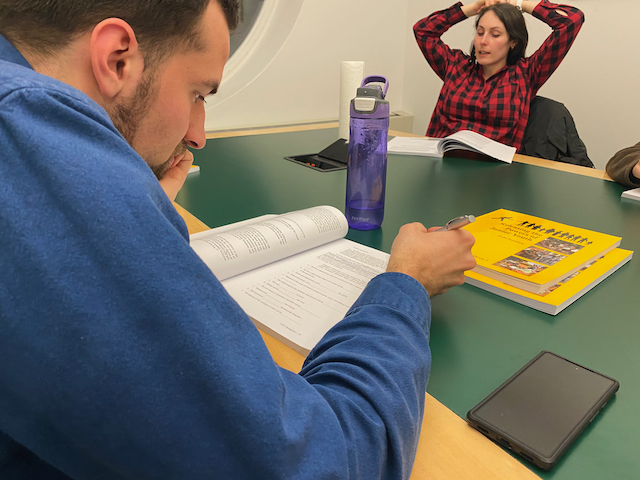Bahá´í fast begins as followers accommodate to the change

A small group, including facilitators Sébastian Box-Couillard (left) and Anissa Collishaw (right), met at the ACES Funk Library on March 2 to study the Bahá´í faith. Participants began the first day of their 19-day fast, which ends on March 20. Lillie Salas
A group of Champaign-Urbana followers of the Bahá´í faith and Bahá´í students gathered at the Funk Library at the University of Illinois on March 2 to support each other on the first day of their 19-day fast.
The Bahá´í faith, they said, is a relatively new world religion made up of three main concepts: the oneness of religion, the oneness of humanity and the oneness of god.
The fast will take place from March 2 to March 20, and participants are expected to not eat or drink from sunrise to sunset, according to the facilitators present at the meeting.
During weekly meetings, a group of university of Illinois students gathers to read informational Bahá´í books and discuss how the group applies the faith’s lessons in their daily lives.
Skye Collishaw, a participant of the meetings, described the fast as a “spiritual detox.”
“Recently, I’ve been thinking about what does it mean to sacrifice something lower for something greater,” Collishaw said. “So, in sacrificing something like a material comfort, you’re trying to focus on a greater spiritual connection.”
Members said their fast did not have unreasonable expectations.
The facilitator of the meeting said Bahá´ís are excused from fasting if they are sick, do manual labor, are pregnant or have other uncontrollable factors that make fasting unhealthy for them.
Faizi Tofighi, a follower of Bahá´í, said he believes fasting is important for all to try.
“I think everyone should try fasting at one point,” Faizi said. “Besides the physical discomfort of not eating, there are positive health and mood benefits.”
Bahá´í students said since the Bahá´í are expected to fast during the hours of sunlight, it can be difficult to get food for university students who do not have access to kitchens.
Bahá´í students and individuals participating in the fast used the dining hall to-go boxes to prepare extra food to eat in the early hours of the morning before fasting until after the sunsets, according to Tofighi.
The members said they were grateful for the option, but said they wished the university offered other accommodations.
“It would be nice to have a little space to go and pray like inside the dining hall somewhere,” Tifighi said. “Like, maybe next to the area with the bathroom, so I can go and have a second to say my prayer before I eat dinner.
“I know the university is working to have more prayer spaces for Muslim and Bahá´í students because we have been asking for it for half a century, I’m sure.”
Participants of the Bahá´í group meetings said that finding a community to support one another through a mentally challenging and important time is important to them.
The 19-day fast marks the end of the last Bahá´í month of the year, which is followed by the Bahá´í new year, otherwise known as Bahá´í Naw-Rúz, according to the Bahá´í teachings website.

